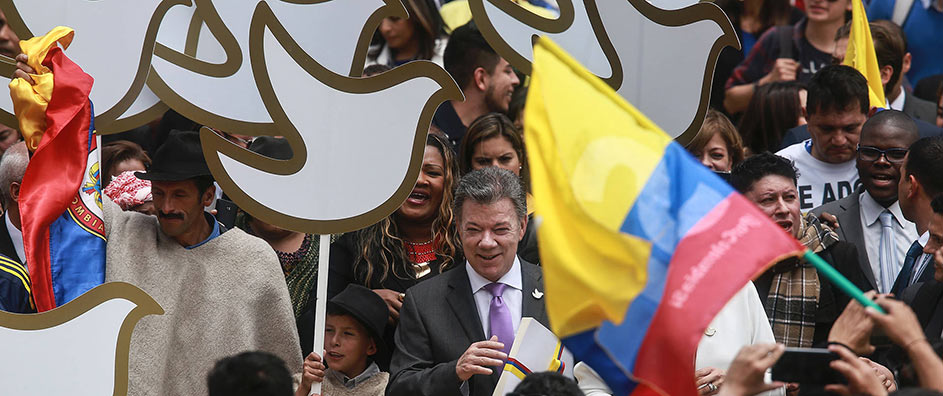Colombia’s journey towards peace, particularly in light of the historic agreement with the Revolutionary Armed Forces of Colombia (FARC), serves as a preliminary investigation into the multifaceted nature of conflict resolution and reconciliation. Such events underscore the tutor-like role of collective spiritual wisdom in guiding societies towards restorative paths. The interplay of Baha’i teachings is profoundly relevant, offering insights that extend the discourse beyond mere political resolutions to encompass holistic societal healing.
The FARC peace agreement, consummated in 2016, was not merely a cessation of hostilities; it marked a seismic shift in the Colombian socio-political landscape. This accord catalyzed the forging of an inclusive national narrative, where formerly marginalized voices could reclaim agency. The profundity of this moment resonates with Baha’i principles emphasizing unity in diversity and the necessity of nurturing a culture of peace. Such a philosophy advocates for the establishment of frameworks that promote dialogue, understanding, and, ultimately, the cessation of conflict.
Within the framework of the Baha’i teachings, the notion of unity is paramount. The Colombian peace process is an embodiment of this core ideal—one that transcends mere tolerance, urging the acceptance of all individuals irrespective of their backgrounds or beliefs. In a society historically plagued by division, the FARC’s commitment to a negotiated peace illustrates a pivotal recognition: true progress stems from collective effort and understanding. This is emphatically resonant within the context of Baha’i doctrine, where community cohesion is seen as a prerequisite for sustainable harmony.
Moreover, the emphasis on consultation, a fundamental method in Baha’i community life, provides an invaluable lens to examine how divergent interests can coalesce. The inclusive dialogue platform established during the peace talks embodies this principle; it engaged myriad stakeholders, fostering a spirit of collaboration. This approach mitigated the perils of unilateral decisions that often exacerbate conflict, asserting that the path to a lasting peace lies in collective wisdom rather than authoritarian dogma.
Beyond governance and political maneuvering, the societal implications of the FARC peace agreement reflect a deeper yearning for healing among Colombians. The scars left by decades of violence are indelible, necessitating an empathic approach to reconciliation. Baha’i teachings underscore the significance of forgiveness and the necessity of addressing past injustices as pivotal elements in advancing toward a unified future. This approach invites a recognition of the transformative power that can arise from acknowledging grievances while fostering an environment conducive to healing.
Additionally, the role of education in nurturing a culture of peace cannot be overstated. As articulated in the Baha’i writings, education is a tool for empowerment, enabling individuals to transcend societal limitations. The Colombian peace agreement has engendered new educational initiatives aimed at promoting inter-community dialogue and understanding, a reflection of the Baha’i commitment to educating the whole person. It is through this multifaceted education that individuals learn to appreciate their shared humanity and cultivate skills necessary for constructive discourse.
However, the pursuit of peace is riddled with challenges. The transition from combatant to civilian life for former FARC members poses a formidable hurdle not only for the individuals involved but for Colombian society at large. Anticipating and addressing the associated societal dynamics require a compassionate framework steeped in the Baha’i principle of the oneness of humanity. By embracing these former combatants rather than ostracizing them, Colombia can foster a sense of belonging that facilitates rehabilitation and societal reintegration—vital for overcoming historical enmities.
Moreover, the international community plays a crucial role in supporting Colombia’s peace-building efforts. The Baha’i perspective advocates for global solidarity and interconnectedness, recognizing that the challenges faced by one nation can reverberate beyond its borders. The collective support for Colombia’s peace process is an exemplar of how global partnerships can coalesce around shared humanity. Through international cooperation, resources and expertise can be pooled, fortifying local initiatives aimed at reconciliation and development.
Diving deeper into the ramifications of the FARC peace agreement unveils another layer of significance: its potential to serve as a beacon for other regions embroiled in conflict. The congruence of Baha’i principles with the mechanisms of peace-building in Colombia provides a replicable model for global societies. The synthesis of empathy, education, and unity can inspire similar frameworks in areas prone to strife, reinforcing the universality of the principles underlying the peace process.
Ultimately, the unfolding story of Colombia is emblematic of a broader human narrative—a simultaneous recognition of our fallibility and our capacity for growth. The tenets of Baha’i teaching illuminate pathways toward reconciliation while reminding us of the intrinsic value of every individual’s experience. This journey embodies a profound lesson not only for Colombia but for all societies grappling with the legacies of division and conflict.
In conclusion, the FARC peace agreement stands as a milestone not merely for Colombia but for the Western Hemisphere. It embodies the transformative potential found within Baha’i principles, advocating for collective effort, compassion, and unity. As the world bears witness to Colombia’s ongoing reconciliation efforts, it too may find enduring lessons on the path to lasting peace.
